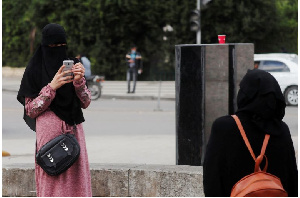The Egyptian government has banned female students from wearing the niqab, a face-covering veil, at schools, according to state-owned media.
Education Minister Reda Hegazy’s statement, released on Monday and quoted by the government-owned Ahram newspaper, said students have an “optional” right to choose if they will cover their hair at school. The statement, however, added that the hair covering cannot cover their face.
“Any form of hair covering that contravenes the condition of the face being visible is not acceptable and the hair covering should be in the colour chosen by the ministry and local education directorate,” it added.
The decision will be enforced starting from the academic year on September 30 and continue until June 8, 2024.
Egyptians, speaking to Al Jazeera on the condition of anonymity, expressed mixed opinions over the ban.
M A, a 33-year-old marketing manager from Alexandria, said he is against the niqab being worn at schools because it obscures what should be a “transparent” educational process.
“Anything that obscures teachers from properly reading the student’s body language and facial expression to be able to help them or show necessary attention should not be allowed at schools,” he said.
M M, who also agreed with the government’s ban, said the implementation of this decision is necessary from a security perspective.
“School authorities should be able to identify people going in and out of schools,” the 38-year-old architect, who is also from Alexandria, said.
He said niqab-wearing students are largely alienated in schools, be they mixed or segregated ones.
On the other hand, he believes the ban might lead some parents to transfer their children from mixed schools to female-only ones.
According to the ministerial statement, a student should make the decision to cover her hair “based on her own personal desire without any pressure or force from any person or any other entity other than the parents”, in an apparent reference to local religious groups and movements.
The statement said parents should be informed of their daughter’s choice and added that authorities will verify the guardians’ knowledge of the student’s choice over the issue.
‘Females always pull short straw’
Writer F A, 45, from Cairo, thinks the government’s decision is the latest case of how women are used as “punching bags … socially, politically and economically”.
“Doesn’t matter under what pretext, or none … females always pull the short straw,” she said.
“A story as old as time and one that continues to be written and many applaud/decry it depending on which lens they have slapped on to see the world.”
She said: “With France banning the abaya and the burkini, Egypt following suit with the niqab ban and before that the US Supreme Court overturning Roe v Wade and the Taliban continuing to severely constrain and constrict females from basically living – the policing of women’s bodies continues.”
I A, a 33-year-old civil engineer, also expressed support for women wearing niqab at schools “as it is part of everyone’s freedom”.
“Egypt is a Muslim country,” he told Al Jazeera, adding that he believed it would be difficult to erase the country’s identity with such a decision.
The government took this decision “to enhance security in all the fields, which I find to be against human rights”, I A said.
The hijab, which covers women’s hair but not the face is widely worn in Egypt, while the niqab is worn more by people from ultraconservative backgrounds.
There have been fierce discussions in Egyptian society over wearing niqab in public spaces and educational institutions for a long time.
Various educational institutions in the country autonomously impose bans on niqabs.
In 2015, Cairo University introduced a niqab ban for its staff, which was upheld in later years by the Egyptian judiciary in 2016 and 2020 despite appeals.
Niqab ban proposals introduced in the Egyptian parliament in recent years were either withdrawn or rejected.
 Home Of Ghana News Ghana News, Entertainment And More
Home Of Ghana News Ghana News, Entertainment And More





